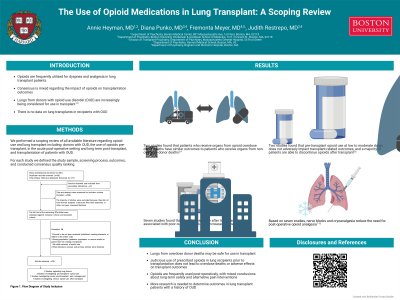Transplant Psychiatry and C-L Subspecialties
(220) The use of opioid medications including medication for opioid use disorder treatment in lung transplant: a scoping review


Annie Heyman, MD (she/her/hers)
Resident Physician
Boston Medical Center
Boston, Massachusetts- JR
Judith Restrepo, MD
Co-Director Transplant Psychiatry
Mass General Hospital
Boston, Massachusetts - FM
Fremonta Meyer, MD, FACLP
Staff Psychiatrist
Brigham and Women's Hospital
Boston, Massachusetts .jpg)
Diana V. Punko, MD
Attending Physician
Massachusetts General Hospital
Boston, Massachusetts
Presenting Author(s)
Co-Author(s)
Background: Opioids are frequently utilized for dyspnea and analgesia in lung transplant patients; however, consensus is mixed regarding the impact of opioids on transplantation outcomes. Additionally, with the growing trend of donation after circulatory death, lungs from donors with opioid use disorder (OUD) are increasingly being considered with growing information on outcomes.1–3
Methods: We performed a scoping review of all available literature regarding opioid use and lung transplant including: donors with OUD, the use of opioids pre-transplant, in the acute post-operative setting and long term post-transplant, and transplantation of patients with OUD. For each study we defined the study sample, screening process, outcomes, and conducted consensus quality ranking.
Results: Two studies assessing outcomes of transplant from donors with OUD, two studies addressing pre-transplant opioid use, seven studies addressing acute post-operative pain management, and seven studies addressing chronic post-operative opioid use were included. Patients who receive organs from opioid overdose donor deaths have similar outcomes to patients who receive organs from non-overdose donor deaths.2 Literature suggests pre-transplant opioid use at low to moderate doses does not adversely impact progression to transplant or transplant-related outcomes and that a majority of patients are able to discontinue opioids after transplant.4 Nerve blocks and cryoanalgesia reduce the need for post-operative opioid analgesia. Chronic opioid use after transplant may be associated with poor outcomes.5
Discussion: Limited data are available to guide the use of opioids in lung transplantation. Available literature suggests safety of lung donation from donors deceased due to opioid overdose. Multiple studies demonstrate interventions that reduce opioid use in the acute post-operative period. Chronic opioid use after transplant may be associated with adverse transplant outcomes. Additional studies are needed to evaluate the outcomes of patients with OUD on medication for opioid use disorder treatment.
Conclusion/Implications: Lungs from overdose donor deaths may be safe for use in transplant, opioid use in lung recipients prior to transplantation does not lead to overdose deaths or adverse effects on transplant outcomes, and opioids are routinely used post-operatively, with mixed conclusions about long-term safety and alternative pain interventions.
References:
1. Raemdonck DEV, Keshavjee S, Levvey B, et al. 5-Year Results from the ISHLT DCD Lung Transplant Registry Confirm Excellent Recipient Survival from Donation after Circulatory Death Donors. The Journal of Heart and Lung Transplantation. 2019;38(4):S103.
2. Donahoe LL, Cypel M, de Perrot M, et al. Outcomes of lung transplantation from donors with a history of substance abuse. The Journal of Thoracic and Cardiovascular Surgery. 2023;165(1):384-395.e4.
3. Whited WM, Trivedi JR, Fox MP, van Berkel VH. Use of Drug Intoxicated Donors for Lung Transplant: Impact on Survival Outcomes. The Journal of Heart and Lung Transplantation. 2017;36(4):S19.
4. Vahidy S, Li D, Hirji A, et al. Pretransplant Opioid Use and Survival After Lung Transplantation. Transplantation. 2020;104(8):1720-1725.
5. Lentine KL, Salvalaggio PR, Caliskan Y, et al. Survival implications of prescription opioid and benzodiazepine use in lung transplant recipients: Analysis of linked transplant registry and pharmacy fill records. The Journal of Heart and Lung Transplantation. 2021;40(6):513-524.
Presentation Eligibility: Not previously published or presented.
Diversity, Equity, and Inclusion: This submission focuses on the intersection of opioid use and lung transplant donors and recipients. The scoping review we present aims to de-stigmatize the use of medication for opioid use disorder treatment and persons with opioid use disorder. Further, our review suggests that lungs from donors who died of overdose may be safe for use in transplantation. We hope our study leads to increased availability of donor lungs, which in turn may reduce disparities in which patients receive a lung transplant.

